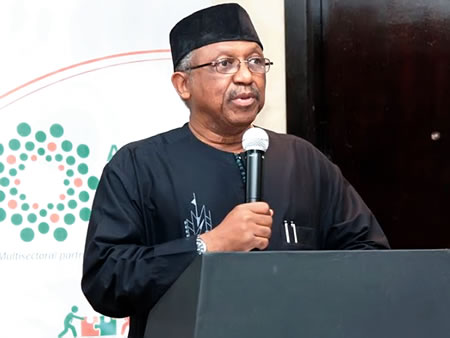The Federal Ministry of Health has said Nigerians spend N480 billion out of pocket expenses on the and treatment, prevention and manpower of malaria in the country.
The Minister of Health, Dr Osagie Ehanire, disclosed this at the National Launch of the Fever Care Media campaign in Abuja.
The National Malaria Elimination Program (NMEP) with support of The US President’s Malaria Initiative (PMI) rolled out the ‘Fever Care’ media campaign with themed ‘Mama Put’ to promote prompt care-seeking for fever, testing all fever cases before treatment and adherence to completing a full dose of ACT when the test for malaria is positive.
Ehanire further said despite these formidable numbers, Nigeria was recording huge gains in the battle against malaria.
According to Ehanire: “The 2018 Nigeria Demographic and Health Survey show that the National prevalence of malaria parasitaemia in children under five years of age has increased from 42 Percent in 2010 to 23 percent in 2015.
“Although, of course, there are significant regional, rural and socio-economic differences. The good news is that we have reduced the malaria burden in young children by almost half,” he explained.
Ehanire added that Malaria was still the leading cause of death in the country and remains a major public health problem, even though it was preventable and curable.
“According to the World Health Organization,(WHO)’s 2020 World Malaria report, Nigeria had the highest number of malaria cases in the world 27 percent over a quarter of global malaria cases and the highest number of deaths from malaria equivalent to 23 percent of global malaria deaths in 2019. In Nigeria, malarial is responsible for 60 percrnt , outpatient visits, and 30 percent of hospital admissions”.
He noted that it takes quiet as all children under the age of five and pregnant women. Noting that It contributes up to 11 Percent of maternal mortality 25 percent of infant mortality and 30 percent of under-five mortality.
“The disease overburdened the health system and hamstrings our economy if we tax the gross domestic product by 40 percent annually,” he added.
Ehanire said that the success had been due to the use of insecticide-treated nets, prompt care-seeking for fever testing fever cases to confirm that they have malaria and the use of appropriate malaria medication.
He added that ending malaria in the country would prevent millions of illnesses and hundreds of 1000s of deaths annually.
“Ending malaria will also increase school attendance, boost worker productivity and significantly lower family’s medical costs. Ending malaria is achievable.
The Deputy Director, Malaria and Tuberculosis, Breakthrough ACTION, Nigeria, Dr Bolatito Aiyenigba said that the vision of NMEP was to have a malaria-free Nigeria.
“However, behavioural barriers which include delay in seeking care for fever, lack of trust in malaria test results and inappropriate treatment of confirmed malaria cases continue to hinder the attainment of this vision.
“Although knowledge and awareness about malaria in Nigeria is currently as high as 97 percent (NDHS 2018), persisting behavioural barriers continue to hinder the attainment of the country’s malaria elimination goal,” Aiyenigba, said.
She added that Social and Behaviour Change (SBC) interventions played an important role in improving malaria testing and treatment behaviours by increasing prompt care-seeking for fever, increasing demand for testing before treatment, and increasing adherence to using and completing artemisinin-based combination therapy (ACT)
“If the malaria test is positive, and not accepting to use ACT if the test is negative”.
According to her, the “Mama Put” series is a campaign that aims to promote appropriate fever care management among Nigerians.
“This is a collaborative effort between FMOH, through the NMEP and the United States Presidents’ PMI through the Breakthrough ACTION-Nigeria project.,” she explained.
The face of “Mama Put” Actress Ada Ameh said,” Mama Put” is a well-loved small restaurant owner with a biting sense of humour and very little patience for foolishness.
Ameh said, she used absurd examples to illustrate the errors of people’s ways, especially when it comes to taking care of fever.
Malaria remains a major public health challenge in Nigeria with a current prevalence of 23 percent down from 27 percent recorded in 2015. The reduction in prevalence rate is largely due to concerted efforts by the Government and the Roll Back Malaria Partnership.
YOU SHOULD NOT MISS THESE HEADLINES FROM NIGERIAN TRIBUNE
Buhari Urges MTN For Quality Service, Downward Price Review In Cost Of Data, Other Services
President Muhammadu Buhari Friday at State House Abuja urged the MTN Group to make the available top-of-the-range service to its Nigerian subscribers… Nigerians spend N480bn out of pocket for malaria treatments Nigerians spend N480bn out of pocket for malaria treatments Nigerians spend N480bn out of pocket for malaria treatments Nigerians spend N480bn out of pocket for malaria treatments.
WATCH TOP VIDEOS FROM NIGERIAN TRIBUNE TV
- Relationship Hangout: Public vs Private Proposals – Which Truly Wins in Love?
- “No” Is a Complete Sentence: Why You Should Stop Feeling Guilty
- Relationship Hangout: Friendship Talk 2025 – How to Be a Good Friend & Big Questions on Friendship
- Police Overpower Armed Robbers in Ibadan After Fierce Struggle






